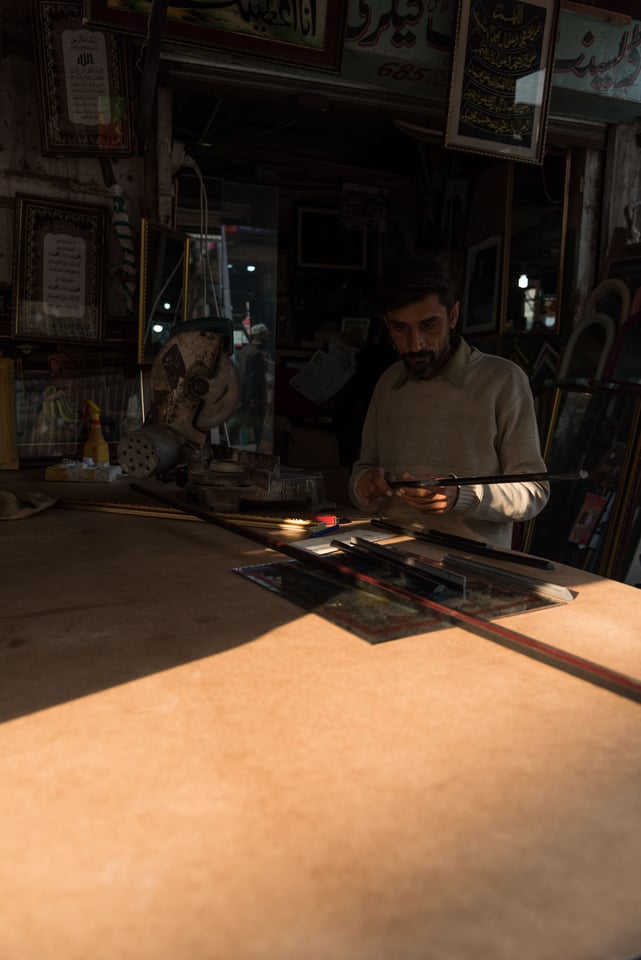Automation? Developing world? This is supposed to be a photography blog, not The Economist! I know. I know. Have patience, dear reader, and it will come together soon. And I promise there will be photos. Let me explain: I have a fascination with photographing Pakistan’s working class. I was born and raised there and have a tremendous amount of respect for the resilience, work ethic and ingenuity of the common people. Whenever I visit, I try to capture elements of that spirit through photography. Some readers may have seen some of my earlier work from there on this site. Here’s the twist: my day job is in tech – one could call my work Silicon Valley-ish – and the big buzzword these days is ‘automation’. The robots are coming and soon we all be out of work. Well, that last bit may just be hyperbole but in reality, no one really seems to know how it will play out. And developing countries may be hardest hit. That’s exactly what was on my mind on my photo walks during a recent trip back home. Keep in mind that in Pakistan, much like the rest of the developing world, manual work is the engine that powers the economy.


NIKON D810 + 24-120mm f/4 @ 66mm, ISO 125, 1/80, f/4.0


To refer to this kind of work as a ‘job’ trivializes it. Often these are vocations, skills, carefully honed crafts that are passed from generation to generation. It is a source of purpose, meaning and most importantly a way to make an honest living and provide for a family.



It is important here not to underplay the physical toll of manual labor. Often this is back-breaking work that brings with it long-term health consequences. It is easy to extol the virtues of it from a word processor on a computer.




That said, it is possible to learn from recent experience with technology and chart a different path. Perhaps, a more prudent approach is possible that focuses on automating grunt work mainly, while preserving other, more creative forms of manual work. The rising demand for ‘hand-crafted’ goods in the developed world suggests that such an approach may be viable.The key of course would be to foster a culture that ascribes greater value to this kind of work and compensates accordingly and fairly.


Amazon is already testing stores where the entire shopping experience can be completed without a single human interaction! Is the world ready for that?


And yet, there are some jobs that machines just can’t do.



Let’s not forget that there is a philosophical element to this discussion. Work that is done by hand has an intangible value, for the consumer as well as the producer. The former acquires something distinct, incorporating unique characteristics derived from the specific context and workmanship of the producer. The latter on the other hand, experiences the satisfaction of creating something of value, something unique, offering a small piece of themselves to this world. Finally, there is an invisible human element at play in such an exchange – a social experience that cannot be quantified.

How any of this plays out remains to be seen. At this point in time, where the AI on our smartphones still struggles with auto-correct, it is safe to say that our robot overlords are not descending upon us any time soon. So, while we humans are still in charge, let us at a minimum, develop an appreciation for the world we have now, where the human element is still alive. Perhaps this will have the effect of making us more introspective, thereby forcing us to take a more considered approach towards our collective future.

Excellent article and lovely photos. Unlike one person who commented on the sometimes extreme contrast, I liked it! First of all, as you said, it makes you imagine what’s opaque. Secondly, if you had taken the time to set up the photo in a different way or with (unnatural) lighting, you would have lost the feeling. Not all photos have to be textbook perfect.
Thanks Kathleen, glad you liked the photos.
great article, great photos
Thanks Joshua
Beautiful article,
The final picture reminds me of the famous Steve McCurry photo of the Afghan refugee girl….
Thank you and to be compared to that photo is very flattering but I must admit when I took, the thought did cross my mind ..
Thanks for some interesting photos. I recently returned from six weeks of travels and photography throughout SE Asia and the theme of your photos is of course in full play there too. In fact, with rapidly growing automation and the adoption of AI the question of the nature and future of work is front and center in the developed economies as well.
My academic background is in International Political Economy and during my career I had the privilege of serving as the CEO of a number of companies internationally [ I retired a while ago and pursuing my artistic side through my photography and sculpture ]. It seems to me that in the context of the theme underlying your photos two fundamentals continue to hold true:
As long as there is an abundance of manual labour – abundance means it is cheap – and the cost of that man power per unit of work remains lower than that of deploying equipment, those people will have work. The day the cost of say100 day laborers exceeds the capital and operating cost of a machine, those people will need to find more skilled work – the need for schooling and vocational training are a core problem that plays out in different ways in all economies across the board, depending on their level of development.
Jobs that are repetitive in nature and that therefore can readily be automated, will be the first ones to go. The ones that require the ability to deal with varying challenges will not. This reality holds holds true for all economies, no matter their level of development. By way of example in our developed economies, this means that with the introduction para legals and dental hygienists are at risk, but lawyers and dentists not. You would no doubt understand how to transpose this to the situation in Pakistan.
I hope you and our host don’t mind these OT comments on a photography blog. Thx again for interesting photos on an equally interesting theme.,
I don’t mind the comments at all. My expertise on the subject is on the technical side and it has been fascinating to get these insights from an economic and operational perspective on – of all places – a photography site. But then, for this particular genre of photography, it is impossible to divorce the images from their context and the context almost always involves some level of politics and culture. If anything, I’m a little disappointed that we seem to be talking more about the text than the photos considering the problem with photo essays often is that people skim through the photos and skip the text (although I did get a TL/DR from one poster). Anyways, thanks for your comments. I found them to be very enlightening.
Great article, thanks for your time!
Great article and your photos tell the story perfectly. The key here is “respect.,”. Everyone that works and every job done should be respected…manual, artisan, or AI engineer.
I grew up working in a small furniture factory in rural Georgia. My father taught me each job from the man that swept the floor to the man that designed the furniture had equal value. Every day I watched him beam with pride at any job well done. Any Job.
Great Article. Keep them coming.
Victor Copelan
Thanks for your kind words Victor. Your father’s words are very wise. That someone who grew up in rural Georgia can look at photos from a place as far away as Pakistan and relate at that level is pretty remarkable to me and is one of the very reasons why I do what I do.
These photos show people working in risky, unhealthy conditions, with little personal protection. What isn’t shown is that, undoubtedly, they also work long hours, without weekends or holidays, or leave for sickness, with no support if they are injured at work, and all for little pay.
First thought is: these people have such poor working conditions when compared to our workers in our “first world / western” countries. However I see this as a false perception, which is based on the definition of the “workers” of a country as the people who hold jobs there. I think a more meaningful definition, especially in this “globalised” world, is that the workers of a country are the people who made the goods that are consumed in that country, which are usually people in developing countries.
When we buy our cheap goods in the shops, we are accepting that the people who make them for us are living and working under these poor conditions, even though we wouldn’t (maybe) find it acceptable for workers in our own countries to do so. And, of course, while we get to buy cheap goods in the short term, in the longer term we are undercutting the basis of our own national economies. When there is no more manufacturing work in our “first world / western” countries, cheap goods won’t help us no matter how cheap they are – we won’t be able to buy them.
The answer to this may be a new form of import tariff – not a tariff based on the country of origin, the type of goods, or the materials that they are made from, but on the quality of the working conditions under which they are produced. This would produce an equalisation between the working conditions around the world, giving many more people a fair income and decent life.
You are absolutely right about the conditions these people face. And yet, whenever I meet them and talk to them, they are friendly, hospitable (it is impossible to enter into a conversation without being offered tea or ‘pepsi’ aka soda) and express a sense of contentment.
Perhaps they are masters at hiding their pain. Or perhaps their faith provides a strength that we can’t grasp. I don’t. As for globalisation – I’ve heard both sides of the argument and just know enough to make up mind. In general, living conditions have improved worldwide (including the West) – then again, there is a genuine sense of discontent, also in the West. I suspect what is really happening is the age old problem of inequality. The rich getting richer at the expense of everyone else. And so instead of dividing around nation and tribe, what we should do is unite against those at the top who are exploiting all of us. But I digress …
A must know: Did you have VR on with these photos?
Intriguing article. Just in the last 2 months I have moved from 34 years of IT work to being a handyman. The personal rewards are enormous, both in physical creativity instead of digital creativity, and resolving a need for an individual person rather than a corporation, usually one who cannot do the work themselves and appreciate my effort more.
I hope humankind foresees the negatives in AI – job losses, loss of creativity, etc, as you have written – and challeges itself to maintain some human qualities to all aspects of life….or else we are doomed.
Footnote: *Chuckling* as I prove “I’m not a robot” to allow me to post comment.
We’re on the same page. And nice catch on the robot question – that’s hilarious – didn’t occur to me at all.
Uh, automation already came at the turn of the last century, and it turned out for the better.
That’s a true statement but that first wave cannot be compared to what’s coming next in terms of scope, magnitude and capability. We’re talking self-learning AI-powered robots that are not just restricted to the factory floor but can act as law enforcement, drive cars, serve tables – you get the picture.